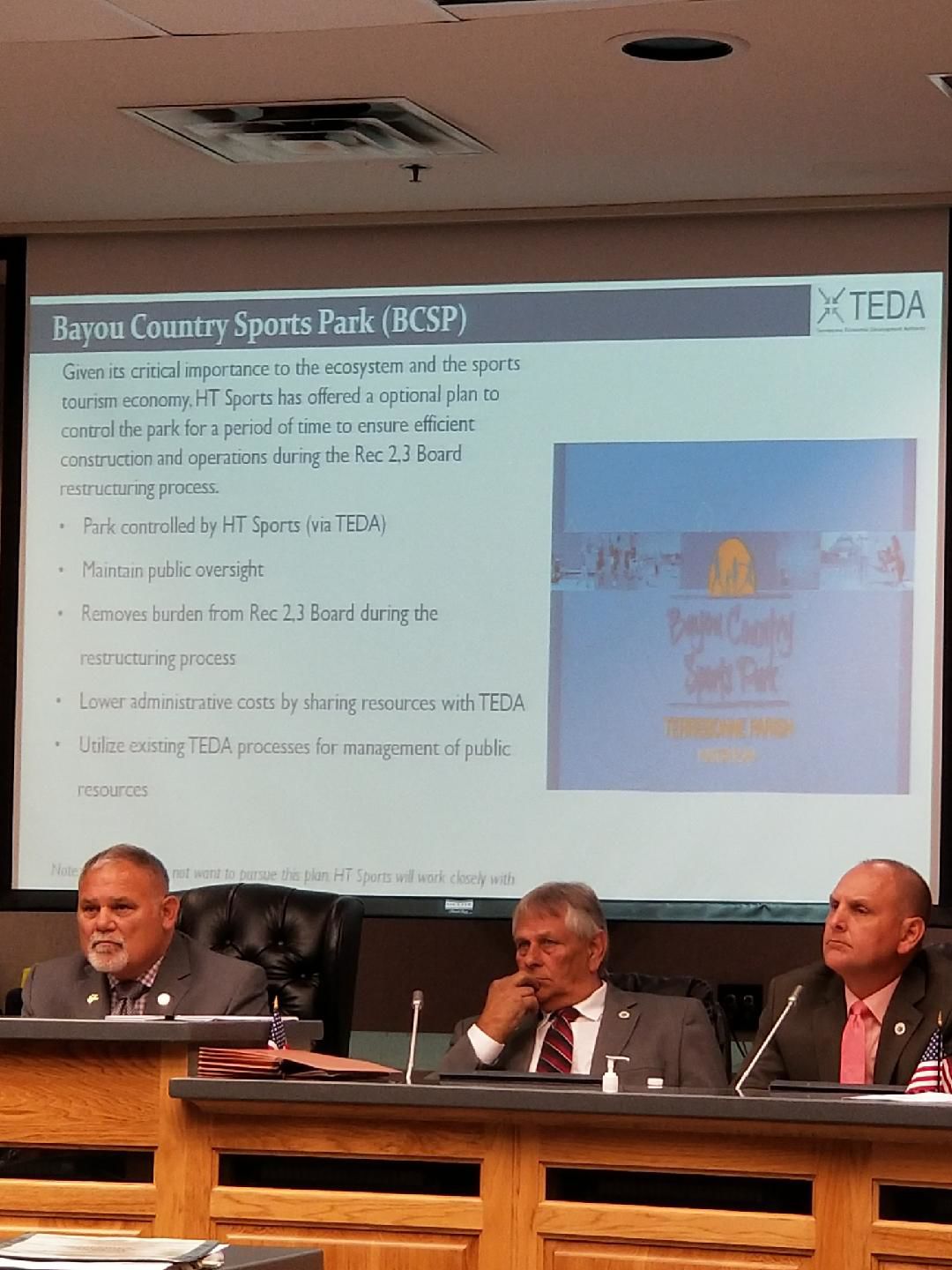
Lafourche Booking Log – June 18, 2018
June 19, 2018
TEDA seeking to take control of Bayou Country Sports Park
June 20, 2018United States Attorney General Jeff Sessions spoke in front of a gathering of the nation’s Sherriff’s departments yesterday at the Ernest N. Morial Convention Center, New Orleans.
Sessions gave a speech focused on reducing recidivism through minimum sentencing and harsher punishment for repeat offenders. This presentation was to the National Sheriff’s Association’s Annual Education and Technology Expo.
“My goal is, fundamentally, to be worthy of the office of the Attorney General,” said Sessions. “Our goal is to make the nation safe and to make sure that people who violate our laws are punished.”
Sessions was brought to the stage to present the National Sheriff’s Association’s 2018 Lifetime Achievement Award; however, as the speaker began to list off the actions which earned the award, recognition began to cross Session’s face, as he soon realized he was being honored.
“The single most important thing that he spends his days doing is supporting the cornerstone of our country’s founders: the rule of law,” said Jonathan F Thompson, Executive Director and CEO. “We think you’re doing a damn good job.”
Sessions held the award in his hands and leaned far back to look the award up and down.
“It looks like a pretty tough person there, John,” said Sessions. “A good sheriff indeed.”
The award was a western style sheriff, in a blue coat, with a black cowboy hat and a silver star on his vest.
Sessions began by saying that he remembered a time during the 60’s and 70’s when, according to him, people committed crimes, and nothing was done about it. He said that the election of former President Ronald Reagan began to fix everything.
Then Sessions sidetracked for a moment to reflect on how he viewed the history of the organization.
“So, 20,000 members, 75 years of history: actually, a lot more history than that right? Anglo-American history,” said Sessions. “The great sheriffs elected by the people. You are really a very important part of the law enforcement community. This is one of the oldest law enforcement groups in the country.”
He then asked for a moment to honor a fallen officer from Florida, William Gentry, who lost his life while on duty last month. He said, the loss of this man’s life was a reminder that law enforcement officers are the “thin blue line between safety and lawlessness.”
“It’s a difficult job, but when rules are fairly applied throughout our country, laws are consistently enforced, life is better,” said Sessions “It’s better for everyone, particularly I say our poor and minority communities – they often need this the most. They don’t live behind walled communities in houses.”
Sessions drew attention to a report, recently released by the Justice Department’s Bureau of Justice Statistics. The report was on rates of recidivism of individuals released from state prisons in 30 states.
According to Sessions, the study found that 83 percent of 60,000 state prisoners, released in 2005, were arrested again in 9 years. He then said two-thirds of those were arrested within 3 years and almost half were arrested in one year.
Sessions then explained the breakdown of drug offenders in the statistics.
“77 percent of all released drug offenders were arrested for a non-drug crime within 9 years, and presumably many were arrested for drug crimes also,” Sessions said. “And nearly half of those arrests were for a violent crime.”
From 1964 to 1980 the overall violent crime rate tripled in America, said Sessions, from 1991 to 2014 violent crime, aggravated assault, and murder each dropped by half; rape dropped by more than a third, and robbery by two-thirds.
Sessions claimed that this was no coincidence, Reagan and the Attorney General at that time eliminated parole, the Speedy Trial Act was implemented, bail was eliminated on most appeals, increased bail on most criminals before trial, the issuing of sentencing guidelines, and in most cases mandatory minimum sentences, “they say I want to give everybody the maximum time; I want people to at least receive the minimum,” he said.
“When a criminal knows with certainty, that he or she is facing hard time, he is a lot more willing to confess – and confession is good for the soul right? – and cooperate with he prosecutors,” Sessions said. “What’s wrong with that?”
Sessions argued that swift and severe sentencing would dissuade others from committing crimes when witnessing that their associates receive harsh punishment; furthermore, this would convince those sentenced to confess. This would assist in information on leaders of criminal activity.
The armed Criminal Career Act was cited during his speech. This law required a 15-year minimum sentence. The law affected felons caught with a firearm after their third robbery, burglary, or violent crime conviction.
“In 2015, after 30 years on the books, one critical line of law was struck down by the Supreme Court as being too vague – the definition really of being a violent crime,” said Sessions. “Because of this impactful ruling, every federal prosecutor lost one of the most valuable tools they have.”
Sessions used this as an example of a tool to reduce recidivism. He said criminals cannot commit crimes if they are serving time.
Using the concept of law, Session pivoted to the topic of immigration.
“There’s an important conversation occurring in this country about whether we want to be a country of laws, or whether we want to be a country without borders.”
Calling the southern border lawless, Session said that a loophole in the law allows illegal immigrants to use children to have immunity from prosecution.
“We cannot and will not encourage people to bring their children or other children to the country unlawfully by giving them immunity in the process,” he said. “Why wouldn’t you bring children with you if you know you will be released and not prosecuted?”
Session said that when parents are prosecuted, children are turned over within 72 hours to the Department of Health and Human Services. He said the children are taken care of and remain in the country, at a cost to the government.
The Convention had numerous stands relating to law enforcement products and services. One stand located near the front door, and witnessing the event was Big Cat Rescue.
Jennifer Leon, the Director of Outreach for Big Cat Rescue, said she felt bad for the protestors and the police.
“I can see both sides of things and for me to come here and be like ‘you should worry about a tiger which you may or may not ever come across,’” said Leon. “It’s hard and for so many of them to be supportive of our efforts and give me their time of day.. I can’t be more thankful.”
On June 25, 2016, the NSA passed a resolution to this effect. According to Leon, the National Sheriff’s Association supports Big Cat Rescue’s efforts to pass “The Big Cat Public Safety Act,” which would restrict private ownership of big cats.
“We are working on legislation to make it harder for people to own tigers, because it’s pretty much legal now,” said Leon. “It’s not so much that people want you to have tigers, it’s that most people don’t think to make laws telling you not to have tigers.”
With 5-1,500 tigers owned as pets, tigers are the most popular big cat pets. She said that they’re in almost every state, and when they get out, law enforcement has to deal with it.
Leon explained that when police are called to deal with a tiger, they are not equipped for such scenarios, and it becomes dangerous for both parties, often resulting in the death of the tiger to protect human life.
Zoos, said Leon, are the only entity properly equipped for this issue, and their tranquilizers take too long to affect the cat. This problem is further compounded because tigers privately owned are muts, and according to Leon, zoos typically only want purebred tigers for conservation purposes.
Leon said one individual was instrumental in helping her organization become involved with the NSA, John Thompson, “If not for him, then none of the animal groups would be here,” she said.
Thompson, Deputy Executive Director and Chief Operating Officer of NSA, was particularly pleased with this event. He explained how dogs were now seen as part of the family.
He was showing off a simulation which trained police officers on how to react to dogs during a raid. According to Thompson, in the old days canines were seen as property.
“Officers across the country haven’t been receiving any information on how to deal with dogs,” said Thompson. “So now we go back to the old days where they just shoot the dog.”
He said times are changing and dogs are being seen as part of the family. As an example, Thompson said the Hell’s Angels were awarded $1.2 million when an officer shot the dog.
Dogs within the police force weren’t being left out in this year’s convention.
Thompson said that K-9 officers who lost their lives in the line of service were also being honored for the first time alongside human officers who’s watch ended.
“So, the dogs are getting their day,” said Thompson. “Times are changing my friend, dogs aren’t just property anymore.”
Sheriff Craig Webre was also in attendance. As a past president he explained how important the event was for networking and allowing officers to lean from and share with one another.
He explained a recent situation in which someone who was in violation of federal gun law, and yet hadn’t broken any local laws. The Alcohol Tobacco and Firearms arrested the individual.
“That’s a very good recent example for when you’re knowing who your federal and state partners are, knowing what their particular expertise and jurisdiction is, and them knowing you makes a big difference,” said Webre.
Webre is one of 3 past presidents of the NSA from Louisiana who still serve on the board: the other two being Sheriff Don Hathaway and Sheriff Greg Champagne.
He said 50 years ago crime was much different and very localized.
“It was very, very, simple, very localized. It was mostly concentrated to people getting drunk, occasional theft, and on a rare occasion you might have a violent crime… you could basically live as an island” Webre said. “Every day it gets more complex, more complicated, it crosses jurisdictional boundaries, and if you’re going to be effective as a CEO whether police chief or sheriff, you have to have a willingness to expand your knowledge base and to look beyond the closed boundaries of your jurisdiction.”
PROTESTS SURROUND SESSIONS’ APPEARANCE
Exiting the packed room, chanting could be heard from the front doors of the Convention Center.
“Arrest Jeff Sessions!”
“Ice are Kidnappers!”
“El Amor no Tiene Fronteras!”
Each phrase was echoed repeatedly, before moving to the next, by a group of about 50-60. This figure was provided by Nicholas Gernon, Commander of New Orleans Police Department.
This group was protesting the separation of illegal immigrants from their families.
Siobhan McKiernan, of New Orleans, was among the protestors holding a sign that read “Families Belong Together.”
She said she learned of the protest by word of mouth and didn’t know Sessions would be in New Orleans until hearing of the protest. McKiernan didn’t know how long the protest would last, but intended to stick it out; afterwards, she would have to go to work.
“I am a parent, but I don’t think you have to be a parent to see that it’s a human rights violation to take kids from there families and put them in prisons,” said McKiernan.
The officers formed a line near the front of the entrance and told protestors it was private property. Protestors spilled out onto the street and continued protesting – 5 were arrested for trespassing. Those arrested received summons and would be released within the next hour on their own signature, said Gernon.
According to Gernon, prior to the street being shut down, one female protestor was struck by a vehicle. She refused medical treatment, didn’t have serious injuries, and the driver stopped his vehicle a few blocks away and made a report with the police. It’s being treated as an auto-accident without any injuries.
Media interviewed protestors, and after voicing their grievances, protestors began to disperse over the course of an hour.














